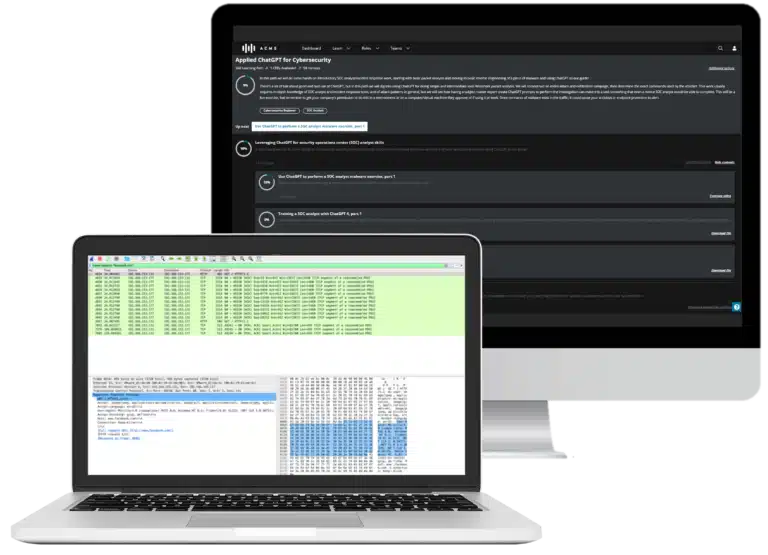How to become a cybersecurity consultant
An exciting career route for an information security professional is that of a cybersecurity consultant. This is an empowering option for a career, but how do you do it?
This article will detail what you need to become a cybersecurity consultant and what the general career path will look like. By the time you are finished reading it, you’ll be equipped with the knowledge of how to take this path if you so choose.
ChatGPT: Self-paced technical training

What exactly is a cybersecurity consultant?
Many organizations have an information security professional, or a team in some cases, to meet their information security needs. When an organization’s budget or need does not warrant full-time information security staff, they hire a cybersecurity consultant.
This shifts the traditional balance of power to the consultant: they can work for as many clients as they want. If the demand exists, the consultant gets to essentially say how much work he wants. Being your own boss has its perks.
Requirements
To become a cybersecurity consultant, it will take a combination of skills, education and years of work experience, with an option of certification.
Cybersecurity consultant skills
Cybersecurity consultants have been called the “catch-all information security expert” and for good reason. A day in the life pulls from an all-inclusive information security skill set that ranges from beginner to expert level.
Some of the skills that you will want to have before opening up shop officially are listed below. Please note that this is just a snapshot: Depending on what path you choose, there may be others you’ll find useful or necessary as well.
Penetration testing
This position will require you to act as both the attacker and defender with regard to your client’s network and security environments. One example of real-life penetration testing skills is the ability to measure the vulnerability of a client’s applications and software.
Firewall management
Cybersecurity consultants are expected to have proficient firewall management skills. Specific skills related to this position include breach detecting, backups and fail-safe features.
Encryption technologies
Encryption is increasingly being used as a key line of defense against data theft and destruction. Cybersecurity consultants should have a good understanding of how encryption will impact the organization’s operations and have experience implementing an encryption solution.
Advanced Persistent Threat management
Advanced Persistent Threats, or APTs, are multi-stage attacks that may proceed through a variety of different attack vectors. Examples of the knowledge required include network access control, phishing and social engineering.
Operating systems
You will need at least an intermediate level of familiarity with Windows, macOS, Linux and other operating systems to be competitive. Not all organizations use the same operating system so diversify your skill set to include as many relevant operating systems as you can.
Principles of ethical hacking and coding practices
When you think like a hacker you can better stop them in their dirty deeds. The skills required include a firm understanding of threat modeling and configuration.
Adversarial/hacker mindset
The other side of the proverbial coin is knowing how hackers/attackers think. Knowing how hackers think will help a cybersecurity consultant better predict the strategies used and where attacks are more likely to be focused. It’s almost more important to be able to think like a hacker than to think from a more defensive mindset.
Programming languages used in raw data storage and processing
The same rule applies here as it does with the operating system skills from above. The more programming languages you know that are used in raw data storage and processing, the better off you will be.
Analysis
Cybersecurity consultants need to have solid analysis skills. This includes the application of industry standard analysis criteria where necessary, such as when analyzing organization security solutions.
Soft skills
There are a range of soft skills that successful cybersecurity consultants rely on daily. These soft skills are listed below.
Leadership skills
Working as a consultant requires leadership skills. This is because it is an independent role with little to no supervision, so being a focused self-starter is crucial. A cybersecurity consultant will often have to take a leadership initiative in solving potential organization cybersecurity issues proactively; in the most involved of situations, you will even be responsible for a security team that reports to you. This takes a high level of leadership skills, especially if you have to manage a security team at every client site.
Communication skills
Effective communication is required to manage security teams but even with clients that do not have a security team you will have to have regular effective communication with executives, department heads, and sometimes even the end user. Without strong communication skills, it’s nearly impossible to be a successful cybersecurity consultant.
Education
There are no set education requirements for becoming a cybersecurity consultant. That said, there are some common ways for professionals to demonstrate that they possess the right education level — mostly by earning a bachelor’s degree. Many earn a bachelor’s degree in information technology, computer science, cybersecurity and related fields. Others satisfy this requirement by gaining the equivalent work experience with relevant certifications.
Work experience
There is no set-in-stone progression of work experience necessary to become a cybersecurity consultant. With this said, cybersecurity consultants in the United States are expected to have three to five years of professional experience.
What would a career path for a cybersecurity consultant look like? Below is one example of a realistic work experience path to becoming a consultant:
- Enter an entry-level IT or information security role
- Earn the role of security administrator, analyst, engineer or auditor
- Acquire some relevant information security certifications
- Begin role of cybersecurity consultant
This may take you longer than three to five years. The position is not one-size-fits-all, and this extends to the length of time needed to gain enough experience.
Certifications
There is no one specific certification that you need to earn for this position, but the more you have, the better. Certifications you can use to help earn this position span the whole range of information security certifications — from beginner to expert. These certifications include:
- CompTIA Security+
- Cybersecurity Analyst (CySA+)
- Certified Ethical Hacker (CEH)
- EC-Council Certified Security Analyst (ECSA)
- Certified Information Security Manager (CISM)
- Certified Information Systems Security Professional (CISSP)
- Offensive Security Certified Professional (OSCP)
Conclusion
Everyone wants to be their own boss: working at their own pace, working as much as they want and not having a direct supervision boss to report to. For those in cybersecurity, becoming a cybersecurity consultant can be the perfect way to gain this freedom. If you can acquire the skills, education, and work experience we’ve explored above, you will have proven to clients that you are in a competitive position to meet their needs.
ChatGPT: Self-paced technical training

Sources
- How to Become a Cyber Security Consultant, ECPI University
- 4 Cybersecurity Career Paths (And the Training to Get You There), New Horizons
- Become a Security Consultant, Cyber Degrees
- How to Become a Cyber Security Consultant, Noodle


